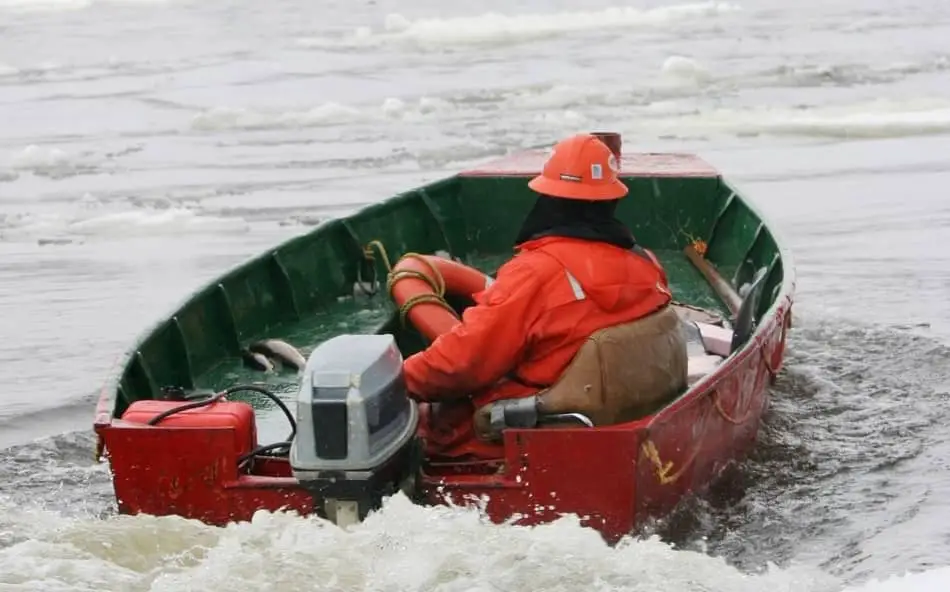Boating in cold water is not the same as boating in normal waters. Coldwater effects the boat speed, and you need to careful while boating in cold water as well. Heres why boat speed is affected or slows down in cold water.
Boats won’t go fast in cold water because the cold water is more viscous and denser (density won’t matter much) than warmer water, and that increases the frictional resistance for a boat, which eventually decreases the boat speed in cold water. But, it’s only a small decrease in speed, not massive.
The main reason for the decrease in speed is the increase in the viscosity of cold water. Otherwise, there won’t be any decrease in speed. Since the viscosity of cold water is more, there is a decrease in boat speed. Otherwise, there won’t be any decrease in boat speed.
The essential factor you need to consider here is viscosity rather than density (a bit below in the post). Density doesn’t effect much with a change in water temperature. Still, the water density lifts the boat a little bit more in the water. In the below table, you can see how the density increases with a decrease in temperature (source).
| Temp. (°C) | Density (kg/m3) |
|---|---|
| 0 | 999.8395 |
| 4 | 999.9720 |
| 10 | 999.7026 |
| 15 | 999.1026 |
| 20 | 998.2071 |
| 22 | 997.7735 |
| 25 | 997.0479 |
| 30 | 995.6502 |
| 40 | 992.2 |
If you keep the boat in water, it displaces the same amount of water space in the water that is equivalent to the boat weight. If the boat weighs more, then it displaces more water (or sinks more in the water), and then the boat needs to push more water out of its way, which decreases the boat speed.
But, if the density of the water changes, then the boat displacing also changes. Meaning if the density of the water decreases, then the boat displaces more water, then the boat needs to push more water out of its way, which decreases the boat speed.

How viscosity of cold water affects the boat speed
Now you might be wondering that cold water has more density, so the boat won’t sink more in the water, which should increase the boat speed. But, practically, it is not happening like that because for cold water, viscosity is more.
The essential quantity you need to consider while boating in cold water is viscosity (not water density), which drops off with rising temperatures. If viscosity is less, then only the boat can move quickly in water. Otherwise, the boat can’t move fastly in the cold water.
Viscosity indicates the intermolecular attraction between the molecules. In cold water, the intermolecular attraction between the molecules is higher than that of normal (warm) water. So, the boat goes slowly in cold water. If it is less (viscosity), then the boat would be going quickly in cold waters.
In the below table, you can see the viscosity of liquid water at different temperatures (source). By that, you can say why boats go slowly in cold water compared to normal (warm) water.
| Temp. (°C) | Viscosity (mPas) |
| 0 | 1.787 |
| 5 | 1.519 |
| 10 | 1.308 |
| 20 | 1.002 |
| 30 | 0.7978 |
What else affects the boat speed in cold water?
Some other factors that affect the boat speed are water depth, boat weight, anything that is attached or stuck to the boat hull, boat length, and boat design.
- Water depth
- Boat weight
- Anything that is attached or stuck to the boat hull
- Length of the boat
- Boat design
All among them affect boat speed. Some of them (length and design) are needed to considered while buying a boat. And some of them (decreasing the boat weight, avoiding shallow waters, and not attaching anything to the hull) are needed to be done regularly to increase the boat speed.
Check my article on Essential factors that affect the boat speed (don’t worry, it will open in new tab) to know more about what else affects the boat speed.
1. Water depth
Shallow waters decrease the boat speed because the water flowing under the boat moves quickly in shallow water, thereby creating high velocity. High velocity at a point in liquid creates low pressure; thus, the boat sinks more and displaces more water. So, the boat needs to push more water out of its way, which decreases the speed.
Check my article on How boat speed is affected in shallow waters? (don’t worry, it will open in new tab) to know more about how boat speed is affected in shallow waters and how the boat hull will affect the boat speed in shallow waters.
The draft of the boat will increase in shallow waters because, in shallow waters, the boat will be moving so close to the ground, and there is less space for the water to flow under the boat, which increases the water flow under the boat (velocity at that particular point in the water increases).
From Bernoulli’s principle, if the velocity is high at any point in the liquid, then there is a corresponding drop in the pressure at the point. Generally, the pressure is required to lift the boat in the water, and if that pressure decreases, the boat will sink more in water, thereby increasing the draft.
If the draft increases, then the boat displaces more water space in the water, and the boat needs to push more water out of its way. Pushing more water out of its (boats) way means, the boat takes more power and time to push that extra water out of its (boats) way. So, it will decrease the boat speed in shallow waters and takes more time to cover a small distance in shallow waters.
2. Boat weight
If the boat weight is more, then the boat displaces more water, and it needs to push more water out of its way as well, which slows down the speed of the boat. Similarly, a boat with less weight displaces less water, and it pushes less water out of its way, which doesn’t decrease the speed much.
If you keep the boat in water, it displaces the same amount of water space in the water that is equivalent to the boat weight. If the boat weighs more, then it displaces more water (or sinks more in the water), and then the boats need to push more water out of its way, which decreases the boat speed.
3. Anything that is attached or stuck to the boat hull
If anything stuck or attached to the hull will affect the speed of the boat. If there is a depth sensor or any barnacles stuck to the boat hull, then the water will not slide over them smoothly. They create some disturbance in the water flow. So, this decreases the boat speed a little bit.
If the boat hull is smooth, only then water will slide over the hull smoothly. Otherwise, it causes some disturbance and gradually decreases the speed of your boat. Barnacles also affect boat speed. So, clean the boat hull regularly to increase the speed a little bit.
Even if you have a keel, it will affect the speed of your boat. Keel means weight, meaning you are adding extra weight to your boat. It displaces more water and creates more friction, and the boat needs to push more water out of its way. So, it decreases the boat speed.
4. Length of the boat
The length of the boat will affect boat speed. If the length of your boat is big, then your boat maximum speed will be more, and if the length of your boat is small, then it will be less. The length of the boat is directly proportional to speed. If the length is more, then the maximum speed is more.
The maximum speed (Hull speed in knots) comes from the formula 1.34 times square root of the waterline (in feet). Waterline is the overall length of the boat (from bow to stern) that is submerged in water.
5. Boat design
Boat design affects the boat speed. If the boat has displacement hull, then boat speed will be less compared to planing hull boat because the planing hull boat has planes, and it will lift the boat bow in air, which allows the boat to go fast without pushing any water out of its way with its bow.
The displacement hull boat tries to push the water out of its way, so, the displacement hull boat will move slowly. Whereas, the planing hull boat is lifting its bow in the air, thereby not at all pushing much water out of its way, so, the planing hull boat will move faster than a displacement hull boat.
Bottom line
Boat speed decreases in cold water because cold water is more viscous and denser than normal (warm) water. More viscosity means intermolecular attraction between the molecules in high. So, the boat speed decreases in cold water.
While boating in cold water density of the cold water will not affect the boat speed much. The viscosity of the cold water will affect the boat speed more because viscosity means the intermolecular attraction between the molecules in the water.
Since the cold waters are more viscous, which means the intermolecular attraction between the molecules is high. So, the boat speed decreases in the cold water.
